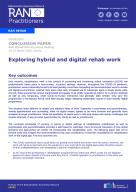Details
- Publication date
- 10 August 2022
- Author
- Directorate-General for Migration and Home Affairs
- RAN Publications Topic
- Rehabilitation
Description
Until recently, rehabilitation work in the context of preventing and countering violent extremism (P/CVE) has predominantly taken place in face-to-face, in-person settings. However, throughout the COVID-19 pandemic, practitioners were occasionally forced to at least partially move their counselling and accompaniment work to remote and digital environments; whether they were video calls, increased use of messenger apps or simply phone calls. And yet, these experiences remain marginalised and appear to be widely regarded as inferior to in-person meetings as well as only temporary, while human-to-human interaction had generally been limited.
Only very few programmes in the tertiary P/CVE work field actually began designing deliberately hybrid or even entirely digital programmes. This situation looks different in related and adjacent fields of work. Especially in psychology and psychotherapy, remote appointments and counselling, often via digital means, appear to be more common and generally more accepted amongst practitioners. While the possibility of digital work in this area comes with certain challenges and caveats attached, it also provides opportunities for clients as well as practitioners.
The combined knowledge of working in hybrid or digital settings of rehabilitation practitioners as well as psychologists and psychotherapists provides a solid basis for extended, more structured discussion of how digital elements and approaches can further be incorporated into rehabilitation work. The following paper sets out to present some first insights and recommendations that may contribute to a collection of guidelines for rehabilitation work in the digital age.
First key outcomes are:
- The COVID restrictions were a push factor for putting more hybrid and online work into action. However, the clock will not be turned back once the pandemic is over and hybrid and digital approaches therefore require further professionalisation and embedding in general rehabilitation practice.
- As for most of the participants in rehabilitation programmes the online and offline worlds are not separate spaces but rather aspects of the one world they live in, a holistic approach by practitioners in this sense will become increasingly important.

